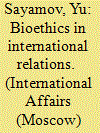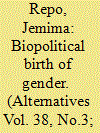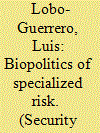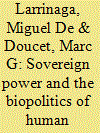|
|
|
Sort Order |
|
|
|
Items / Page
|
|
|
|
|
|
|
| Srl | Item |
| 1 |
ID:
107631


|
|
|
|
|
| Publication |
2011.
|
| Summary/Abstract |
Biomass co-firing systems in power plants generate electric power by the simultaneous combustion of biomass and fossil fuels. The co-firing process reduces investment costs by converting biomass energy into electricity in existing conventional power plants. Biomass co-firing significantly reduces carbon dioxide and sulfur dioxide emissions in power generation. To meet the increase in biomass demand, this paper has considered systematic energy crop production, which is expected to increase in the near future. Our aim is to analyze biomass co-firing systems in the Taiwanese electricity market. In this paper, we study two emerging biomass feedstocks: switchgrass and Miscanthus. We focus on the impact of energy crop co-firing on carbon dioxide and sulfur dioxide emissions for electricity generation. A Nash-Cournot competition model, which simulates potential biomass co-firing scenarios, is formulated for power markets. A case study conducted in the Taiwanese electricity market showed that biomass co-firing lowers total electricity demand and sale. Miscanthus is more economical than switchgrass in terms of the production cost and the land required to generate biopower for the same levels of biomass co-firing.
|
|
|
|
|
|
|
|
|
|
|
|
|
|
|
|
| 2 |
ID:
188467


|
|
|
|
|
| Summary/Abstract |
THE PRESENTATION of Biblioteka bioetiki [The Library of Bioethics] at the Ministry of Foreign Affairs of the Russian Federation offered an occasion to return to the discussion of the global challenges facing humanity amid unprecedentedly rapid and radical changes to the world and international relations. This unique 10-volume publication, prepared on the initiative of Academic Alexander Chuchalin, chairman of the Russian Committee on Bioethics, draws upon the creative legacy of outstanding thinkers of the past and inspires contemplation of the present in which the range of bioethical problems is constantly expanding and occupying an increasingly important place in anxious reflections on the future of civilization.
|
|
|
|
|
|
|
|
|
|
|
|
|
|
|
|
| 3 |
ID:
122995


|
|
|
|
|
| Publication |
2013.
|
| Summary/Abstract |
This article argues that gender was invented in the 1950s as a new sexual apparatus of biopower. Through a reading of mid-century sexological studies against the background of structural-functionalist and behaviorist theories of social order, it shows how gender was born in the clinic to discipline the reproduction of life in new ways. The truth of sex was no longer found in the genitals or mind, but in the contingent cognitive processes of a behavioral control system. The gender apparatus produced systematized protocols for sex reassignment surgeries for infants with ambiguous genitalia and rendered the family a panoptic institution, all to ensure that children were socialized into normative gender roles guaranteeing the continued reproduction of the life of the species. The violence of this new life-administering technology was crystallized in the pedagogical techniques employed by physicians designed to persuade their child patients to submit themselves to the normalizing care of surgeons and psychiatrists.
|
|
|
|
|
|
|
|
|
|
|
|
|
|
|
|
| 4 |
ID:
078775


|
|
|
|
|
| Publication |
2007.
|
| Summary/Abstract |
This article offers a biopolitical security analytic of kidnap and ransom (K&R) insurance. It suggests that security phenomena should be analysed in terms of the problematizations through which they are expressed. With reference to Foucault's concept of biopower, K&R insurance is studied as part of a security dispositif designed to deal with the problematic of kidnap risk. The biopolitical security that results is aimed at enabling the circulation of the client should a kidnap event occur. As such, it is a personalized private provision of security premised upon the promotion of an individual's capacity to circulate in the future. Using the story of a kidnap event, the article analyses the micro-practices through which a population of `kidnapping prospects' is created, the underwriting process through which prospective clients undergo a security audit, and the forms of security that derive from this dispositif. It argues that the value of the concept of biopower for security analysis is its potential for explaining problematics that are not circumscribed to a fixed referent object but relate to the emergent features of the changing character of the human being
|
|
|
|
|
|
|
|
|
|
|
|
|
|
|
|
| 5 |
ID:
190678


|
|
|
|
|
| Summary/Abstract |
On 17 June 2017, Ali Khamenei, the supreme leader of the Islamic Republic of Iran, called on pro-regime vigilantes to ‘fire at will’ or to act on their own discretion in putting the state’s Islamic teaching into practice without the need to consult either their superiors or the relevant authorities. Our article argues that, since 1979, the policy of ‘firing at will’ has been the defining feature of the Islamic Republic’s model of governance and corresponds to the spirit of its constitution. Inspired by the scholarship on disciplinary policies, this article seeks to contextualize the ‘firing at will’ policy within the ethno-religious and racial discourse embodied in and warranted by the Islamic Republic’s constitution. Finally, by discussing the state’s violent treatment of Kurdish kolbers (cross-border laborers), we will show how the Iranian state’s internal colonial policies have engendered a state of exception and normalized the daily spectacle of violence in Eastern Kurdistan.
|
|
|
|
|
|
|
|
|
|
|
|
|
|
|
|
| 6 |
ID:
178248


|
|
|
|
|
| Summary/Abstract |
Leading feminist scholars and activists have critiqued the current impact of South Africa’s provisions for gender equality and sexual rights. The country boasts one of the most progressive constitutions in the world, and its formal mechanisms for gender transformation and sexual citizenship are – at a global level – pathbreaking. At the same time, however, violence against women, gender non-conforming people and gays and lesbians or ongoing gender-based injustices in workplaces, educational institutions and many homes testify to the fact that such measures have not transformed ideological beliefs, institutional cultures and power relations in many public and domestic contexts. This article confronts the disjuncture between the formal provision of rights and actual practice, by analysing the effects of provisions devoid of transformative impact. It is argued that the country’s seemingly democratic arrangements for gender justice and sexual citizenship reproduce new forms of governmentality, biopolitics and biopower. By drawing on the work of Jasbir Puar, the article argues that South Africa’s imagining as a democratic state is based largely on its provision of rights around sexuality and gender, and in relation to peripheries that are ‘measured’ by the absence of these. In the global imagining, gender equality and sexual citizenship currently serve as tropes for definitive freedoms and democracy. The recognition of gender equality and sexual citizenship ratifies a particular international understanding of ‘democracy’, one that is congruent with global neoliberal standards, and that actively reproduces the gendered, heteronormative, classist and racist status quo.
|
|
|
|
|
|
|
|
|
|
|
|
|
|
|
|
| 7 |
ID:
077546


|
|
|
|
|
| Publication |
2007.
|
| Summary/Abstract |
This article examines the forms of power brought into play by the deployment of biometrics under the lenses of Foucault's notions of discipline and biopower. These developments are then analyzed from the perspective of governmentality, highlighting how the broader spread of biometrics throughout the social fabric owes not merely to the convergence of public and private surveillance, but rather to a deeper logic of power under the governmental state, orchestrated by the security function, which ultimately strengthens the state. It is associated with the rise of a new governmentality discourse, which operates on a binary logic of productive/destructive, and where, in fact, the very distinctions between private and public, guilty, and innocent-classic categories of sovereignty-find decreasing currency. However, biometric borders reveal a complicated game of renegotiations between sovereignty and governmentality, whereby sovereignty is colonized by governmentality on the one hand, but still functions as a counterweight to it on the other. Furthermore, they bring out a particular function of the "destructive body" for the governmental state: it is both the key figure ruling the whole design of security management, and the blind spot, the inconceivable, for a form of power geared toward producing productive bodies.
|
|
|
|
|
|
|
|
|
|
|
|
|
|
|
|
| 8 |
ID:
094319


|
|
|
|
|
| Publication |
2009.
|
| Summary/Abstract |
In the past decade there have been efforts to understand the war on terror through the writings of Michel Foucault and Giorgio Agamben. Some analyses reify certain concepts employed by Foucault and Agamben. Others do not accurately represent the actual occurrence of violence at ground level. Without claiming to present a sovereign gaze on the literature and the reading of sovereign violence in places such as Guántanamo, this article argues that there are at least three central elements that philosophers and theorists might want to reconsider in connection with sovereignty, biopower, and subjectivity: that there is a Derridean logic at play between sovereignty and biopower; that there is a connection between sovereignty and subjectivity informed by a "dangerous connection" between power and knowledge; and that sovereignty is informed by a classifying and hierarchizing regime characteristic of a regime of truth. Although Agamben claims to correct Foucault, he betrays important methodological and epistemological elements of Foucault's work. Nevertheless, there are elements in Agamben's work that can shape our understanding of a "biopolitical reading" of our contemporary era.
|
|
|
|
|
|
|
|
|
|
|
|
|
|
|
|
| 9 |
ID:
167105


|
|
|
|
|
| Summary/Abstract |
The essays in this special section demonstrate—in case anyone still believes otherwise—that the Aadhaar project is an exceptionally interesting problem for contemporary social science. Nandan Nilekani’s impossible programme of capturing proof of the names, births, addresses along with fingerprint and iris biometrics from over a billion people has revealed new features of the politics of networked technologies, of bureaucratic rationality, and of ordinary people’s strategies for dealing with both. The project has both changed globally-held perceptions of the possibilities for new forms of state capacity and confirmed the old, Arendtian view of bureaucracy’s capacity for banal evil.
|
|
|
|
|
|
|
|
|
|
|
|
|
|
|
|
| 10 |
ID:
106663


|
|
|
|
|
| Publication |
2011.
|
| Summary/Abstract |
As successors to structural adjustment programmes, Poverty Reduction Strategy Papers (prsps) were introduced in 1999 as preconditions for World Bank and imf concessional financing and for debt relief. prsps now serve as the basis of negotiations for a variety of development financing and have influenced the design of other aid instruments. This paper considers the impact of the prsp framework on the constitution of global economic governance, in particular its effect in foreclosing possibilities for a radical revision of the rules and institutions of international economic law. The paper argues that the prsp project not only reframes fundamental tenets of international co-operation and global communal responsibility but also establishes a new disciplinary framework for Third World state engagement with the global economy and the international law which sustains it. In this way the discourse and methods of resistance against the injustices of the international order have been appropriated to distil such dissent through qualified operationalising of contestable notions of 'participation', 'ownership', 'partnership' and 'poverty reduction', disabling the resurgence of any form of emancipatory politics in the international economic order, whether through a state-led nieo-style revival or cosmopolitan social movement.
|
|
|
|
|
|
|
|
|
|
|
|
|
|
|
|
| 11 |
ID:
084018


|
|
|
|
|
| Publication |
2008.
|
| Summary/Abstract |
This article examines the manner in which the human security discourse enables a dual exercise of sovereign power and biopower. Drawing from the work of Michel Foucault and Giorgio Agamben, it argues that human security contributes to this dual exercise by conceptualizing a form of life rendered amenable to biopolitical technologies and rationalities while simultaneously defining the conditions of exceptionality that assist in sovereign power's ability to authorize international interventions meant to secure human life. This frame of reference is then mobilized to read the human security discourse within the broader developments of the concept of security from the immediate postwar period to the post-9/11 moment. It is argued that the human security discourse informs the current biopolitical networks of world order and often works in conjunction with - rather than against - the global exercise of sovereign power made evident by the `war on terror'.
|
|
|
|
|
|
|
|
|
|
|
|
|
|
|
|
|
|
|
|
|